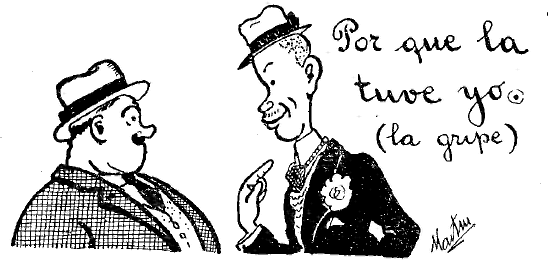
| Языки :: Испанский |
| Аудио |

 |
|
 |
|
173 |
Español |
Spanish |
|
Lección Sesenta (60) |
||
| Muy sencillo | (It's) very simple. | |
| 1 |
En el despacho (1). — El director a la mecanógrafa : |
At the office. — The director, to the typist : |
| 2 | Señorita, haga el favor de llamar al intérprete, para que venga (2) a ayudarme; | Miss, call [at] the interpreter, please, that he may come to help me; |
| 3 |
necesito pegar quinientos sellos. — ¿El intérprete para pegar sellos? |
I must [need] stick 500 stamps. — The interpreter to stick stamps? |
| 4 | Naturalmente, ¿no posee (3), siete lenguas? | Of course, does he not possess seven tongues? |
| 5 |
Entre amigos. — ¿Qué tiene Ramón? — Creo que la gripe. |
Between friends. — What's the matter with [has] Raymond? — I believe it's [that] the flu. |
| 6 |
Pues es una enfermedad (4) mala. -— ¿Por qué? |
Well it's a bad illness. — Why? |
| 7 |
Porque se queda uno imbécil. — ¿Y como lo sabe usted? -— Porque la he tenido yo. |
Because one remains an imbecile. — And how do you know (it) ? — Because I had it. |
| 8 |
En el juzgado. — ¿Es cierto que usted ha roto este bastón en la cabeza de este señor? |
In court. — Is it exact that you have broken this cane on [in] the head of this gentleman? |
| 9 |
Sí, señor juez, pero fué sin querer. Mi intención era romperle la cabeza, sin romper el bastón (5). |
Yes, your Honour [Mister Judge], but that was without wanting (it). My intention was to break his head, without breaking the cane. |
| EJERCICIOS | EXERCISE : | |
| 1 | No conozco bien el español, | I don't know Sp. very well, |
| 2 | pero creo que ya sé bastante para hacerme entender (or : comprender) ; | but I think that I know enough already to make myself understood; |
| 3 | me bastará seguir estudiando un par de meses para hablarlo regular. | (it) will suffice me to go on [follow] studying a couple of months to speak it satisfactorily. |
| 4 | ¿No le fastidia (or : aburre) a usted el estudio? | Does not study bore you? |
| 5 |
Al contrario, me divierte; es un pasatiempo después del trabajo del día. |
On the contrary, it diverts me; it's a pastime after the day's work. |
| 6 |
i Un pasatiempo! Aprender de memoria centenares de palabras y de frases imbéciles (or : estúpidas) : |
A pastime! Learning by heart [of memory] hundreds and hundreds of words and silly sentences : |
| 7 | "la tía del abogado es pobre, pero mi primo tiene una cuchara ". | "The aunt of the barrister is poor, but my cousin has a spoon." |
| 8 |
No, amigo; está usted muy atrasado; no se aprende ya de ese modo. |
No, my friend; you are much behind your time [belated]; one no longer learns a language in [of] this way. |
| NOTES. | |
| 1 |
Or : la oficina. Despachar, to send, dispatch or to retail. |
| 2 | He comes : viene; let him come : que venga, |
| 3 |
Naturalmente or Claro. — Poseer (hard s): to possess. |
| 4 |
Enfermo, ill. — Encerrado, shut in. — Cerrar, to shut, to close cierro, I shut, I close; cerrado, shut, closed. |
| 5 |
Romper, to break, is, in the past partic. : roto,
broken, — El juez (Hwéth), the judge; juzgar, to judge juzgado, judged, el juzgado, the court, tribunal. |
|
Conocer, yo conozco, usted conoce : to know; I, you know. A hundred : un centenar; a thousand : un millar; a milliard : mil millones; a centenarian : un centenario. |
